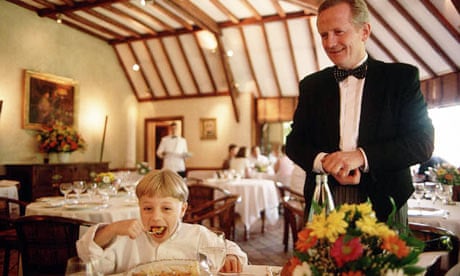Remember those bleary early feeds, as a newborn? Cradled in protective arms, you drifted off into drowsy euphoria, with sweet, viscous milk lining your toothless mouth. No, neither do I, but from the word go, baby brains start linking flavours with experiences and so our most deeply entrenched association with eating is that it is comforting. Not just for satisfying a need for fuel, but in an all-encompassing way.
Sure, as we shuffle hungrily through our mortal coils, our preferences change, but some of those early food learnings will stay with us. I, for instance, may have gone off milk before turning one year old (present me with a glass of any kind of milk and my face will curdle ), but melting milk chocolate on my tongue, coating it with sugary, dairy gloop is immensely comforting to me. Why do you think vanilla ice-cream is the world's best-selling flavour? "It is the closest adult food to breast milk," says Chris Lukehurst, head of research at the Marketing Clinic, which advises food manufacturers from Ella's Kitchen Organic baby food to Absolut vodka how to make their products appeal both practically and emotionally. Mother's milk, he says, tastes vanillic.
Children: supertasters and synesthetes
Infants have around 30,000 tastebuds spread throughout their mouths. By the time we hit adulthood, only about a third of these remain, mostly on our tongues. So eating is an intense experience for the very young. No wonder nursery food is traditionally bland.
There are suggestions that we are born with synesthesia, that curious condition where the senses are intermingled (the connections between them are usually broken as we mature), so children could be tasting food in 3D, Technicolor and Dolby surround sound. The look on my two-year-old's face after his first lick of a Cornetto attested to this theory.
Babies' tastebuds are configured in line with their craving for fat and sugar-packed milk. "They need more calories in relation to their body weight than at any other time in a person's life," says Mohammed Moghadasian, a professor of human nutritional sciences. Salty and sour flavours, therefore, aren't on their radars yet, and bitter foods are rejected as potential poisons. Interestingly, umami, the immensely moreish taste that has been synthesised in the form of monosodium glutamate, is abundant in breast milk.
Children don't tend to lose their extremely sweet teeth until puberty. The reason they often don't eat their greens could be that the bitter notes in them are amplified by so many tastebuds. And as we keep pairing flavours with experiences and forming prejudices, by the time children's palates are more accepting of vegetable flavours they are negatively associated with parental nagging – an altogether different mood to that of the fun occasions when sweet treats are bestowed.
Teenagers: aspiration and alcopops
Older children badly want to do adult stuff, and will force themselves to ingest things they hate the taste of, such as beer and coffee. We've all been there. We pretend to like them until neuropathways develop in such a way that we genuinely start to enjoy the bitterness and mildly caustic sensations. That said, young people are preferring ever sweeter alcoholic drinks, especially, says Lukehurst, if their palates have been trained by processed foods targeted at them. Step forward alcopops. This is also why, says Lukehurst, "cider continues to grow more popular, while lager brewers are desperately seeking to create sweeter products".
Hormones play a starring role in how we experience food. A Danish study in 2009, for example, showed that girls are more sensitive to sweet and sour tastes than boys, who need a higher concentration of, say, sugar to get the same hit of sweetness.
Adulthood: sophisticated but set in our ways
Maturity brings more grown up (and healthier) eating habits, with an appreciation of robust flavours like game, sour cheese and anchovies. However, whether or not this is a sign of a sophisticated palate is moot. Some argue that because our tasting senses dull with age (especially if we smoke or scald our tongues often), we are simply more tolerant of pungency.
And as we mature, it becomes harder to welcome new tastes. "There's a phenomenon in nutrition we call programming," says Moghadasian, "which is a nervous-system issue to do with how we perceive food. If you get used to specific types of food or drink when young, then your brain will be programmed to accept the flavours, colours and other features of these foods." But with age, the brain's capacity to be trained and retain information becomes less efficient. If immigrants are over 35 or 40, he says, they will usually stick to their traditional cuisine, whereas children will adapt to the local food.
Old age: dry mouths and dentures
At 95, literary doyenne Diana Athill says: "My appetite is much smaller and I have a much sweeter tooth than I used to have." Her theory is that older people enjoy the quick and easy energy hit.
There are a number of reasons why we might eat less as we age, according to Margot Gosney, a professor of geriatric medicine, specialising in nutrition: "There's a shrinkage of the stomach. And the brain tells the older person they're full much more quickly. There's also a change in the mechanism in the brain telling us we need food or drink in the first place – it's really easy for older people to get dehydrated."
Saliva flow is much reduced in old age, too, taking away some of the enjoyment of eating. "Saliva cleans the tongue and works like a lubricant when we swallow," says Moghadasian. "And it contains enzymes that start digestion of starch, for example." Wearing dentures, a weaker senses of taste (old people need much more salt and sugar to be able to detect them) and smell, along with taste-altering medications, and conditions like dementia and stroke, can all further conspire to dampen the appetite.
Athill still enjoys eating though. "If I go out and have a delicious dinner I would eat much more than if I stay in," she says, when "fruit and a Horlicks" will suffice. There goes that comforting warm, milky drink again.
Now, I shudder at the foods which I craved in my youth such as cheap chicken nuggets. Are you disgusted by what you ate when you were younger, and has your palate become more sophisticated with age? When have you been the most adventurous with food and how else have your tastes changed?






Comments (…)
Sign in or create your Guardian account to join the discussion